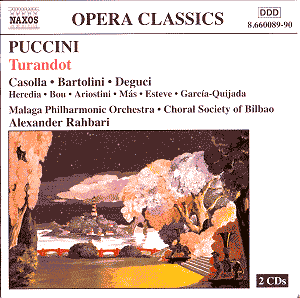

BUY NOW
Giacomo PUCCINI (1858-1924)
Turandot (1924) (105.48)
Giovanna Cosolla, soprano, Turandot; Masako Deguci, soprano,
Liú; Lando Bartolini, tenor, Calaf; Felipe Bou, bass,
Timur; Armandon Ariostini, baritone, Ping; Javier Más,
tenor, Pang; Vicenç Esteve, tenor, Pong; Francisco
Heredia, tenor, Altoum.
![]() Choral Society of Bilbao
(Bilboko Koral Elkartea)
Choral Society of Bilbao
(Bilboko Koral Elkartea)
Escolania Santa Maria de la Victoria Children’s Chorus
Malaga Philharmonic Orchestra/Alexander Rahbari
Sung in Italian. Notes/synopsis: English; German. No text. Cast biographies
in English.
Recorded Teatro Municipal Miguel de Cervantes, Madrid, Spain, 27 October
2001
![]() NAXOS 8.660089-90 [2CDs:
105.48]
NAXOS 8.660089-90 [2CDs:
105.48]
Comparison Recordings:
Leinsdorf, Nilsson, Tebaldi, Bjoerling, Tozzi BMG/RCA ‘Living Stereo’ 62687
Erede, Borkh, Tebaldi, del Monaco, Corena Double Decca 452 964-2
Mehta, Sutherland, Pavarotti, Caballé, Ghiaurov Decca 414 274-2
Karajan, Ricciarelli, Hendricks, Domingo, Raimondi DG 423 855-2
Previtali, Udovich, Corelli, Mattioli, Clabassi [VHS] Bel Canto Society 0544